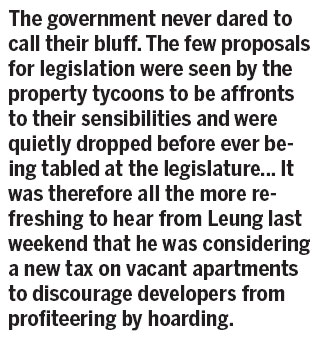Govt must move swiftly to tax vacant apartments
Updated: 2013-01-23 05:52
By Hong Liang(HK Edition)
|
|||||||||
Like many people who care about Hong Kong, I read Chief Executive Leung Chun-ying's Policy Speech last week carefully. The CE seemed to have hit a chord in people's hearts by focusing on the topic of greatest concern to all, affordable housing.
Based on his successful past career in the Hong Kong property sector, we have little doubt that he knows what he's doing. The policy initiatives aimed at increasing the supply of housing he outlined in his speech seem to make practical sense. But we were nevertheless disappointed by his unwillingness to take on the property oligarchy, consisting of no more than half a dozen large developers who, together, have gained a stranglehold on the supply of apartments in all market segments.
As we all know, the increase in sales of government land, as proposed by Leung, does not necessarily lead to a corresponding increase in the supply of apartments in the market.
Government land auctions, understandably, are dominated largely by this oligarchy. To be sure, there are rules that require the successful bidders to develop the land they bought within a certain time frame. But there is no time requirement for them to sell the apartments after completion. Many developers are known to manipulate the supply by withholding sales of completed apartments, waiting for prices to go up to maximize their profits.
The public in the past grudgingly accepted the government reluctance to confront the property developers as a necessary compromise to sustain the flow of land-sale revenue, which has become an increasingly important source of funding for the ever increasing recurrent expenditure on education, social services and healthcare. But that acceptance has turned to anger as public patience and understanding is being severely strained by escalating property prices in the past several years.

As a result, the relationship between government and developers is seen less as a partnership for the general good and more as an uneven alliance benefiting the developers while denying more and more people the chance to buy their own homes. Calls for reform by liberal politicians, economists and social activists seemed to have elicited nothing but occasional threats by some real-estate tycoons to pull their money out of Hong Kong.
The government never dared to call their bluff. The few proposals for legislation were seen by the property tycoons to be affronts to their sensibilities and were quietly dropped before ever being tabled at the legislature. Even something as sensible and logical as the proposal to require developers to disclose the usable floor area of the apartments they sell was snuffed in the face of stiff resistance from the powerful industry group. It was therefore all the more refreshing to hear from Leung last weekend that he was considering a new tax on vacant apartments to discourage developers from profiteering by hoarding.
"It is not pure commercial behavior that the government sells land to developers for construction," Leung said. "We rely on them to deliver homes in a timely manner to address people's needs," he added.
Leung warned that he "will not just sit and do nothing" if there really are attempts by property developers to hoard apartments with the intention to push up prices.
Obviously, attempts have been made. Official figures cited by the South China Morning Post showed that last year, of the 6,100 flats built by the private sector, one-third, or 2,000, remained unsold. Of the 9,400 flats built in 2011, 1,000, or 10 per cent, are still unsold.
If Leung is true to his word, he will have to introduce the tax at a rate high enough to negate the benefit derived from the developers' expectations. It's time for the government to muster the courage to stand up to the powerful real-estate moguls. We just hope that Leung will do it right the first time.
The author is a current affairs commentator.
(HK Edition 01/23/2013 page3)